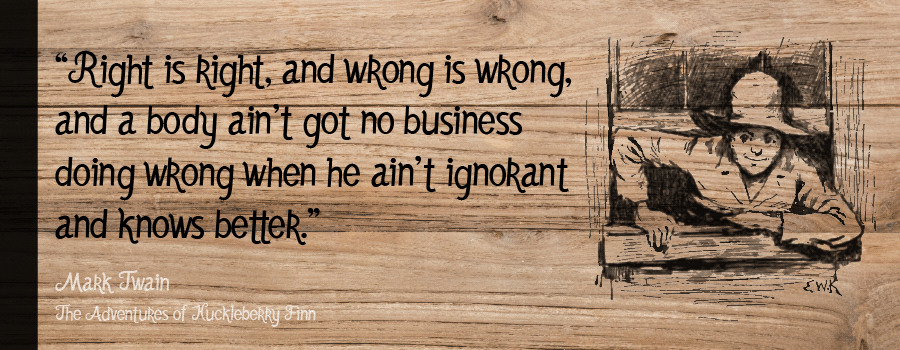16 Huckleberry Finn Quotes Everyone Should Know

Of Mark Twain’s 28 full-length books, The Adventures of Huckleberry Finn (1885) always stands out as his supreme achievement.
Beyond its importance as a classic boy’s adventure tale, this oft-challenged book raises significant questions about racism, religion, violence, right versus wrong, and the nature of freedom. As Huck, Jim, and the other characters go downriver, these questions become inescapable.
So what is it that makes this book so memorable?
Below, we’ll explore 16 Huck Finn quotes that highlight the complexities of this great American novel.
The Best Quotes From Huckleberry Finn
“All right, then, I’ll go to hell.”
These seven words from chapter 31 are amongst the most memorable in American literature.
At this point in the novel, Huck Finn has just realized the Duke and Dauphin have betrayed the runaway slave Jim and sold him into captivity. Jim will be transported back to Miss Watson if Huck Finn stands idly by.
At first, Huck thinks it’d be better to warn Miss Watson, so he writes a letter explaining the situation. Once he has the letter in his hands, however, Huck decides to tear it up and save Jim. Rather than listening to society’s warning that helping runaway slaves will lead to eternal damnation, Huck follows his gut instinct and makes one of the most important moral decisions of his life.
Strangely, Twain undercuts this powerful scene with a disturbing exchange between Huck Finn and Aunt Sally in the next chapter. When asked what took him so long to arrive, Huck (who is posing as Tom Sawyer) lies about a cylinder head exploding on a steamship. Aunt Sally asks if anyone was killed in the explosion, and Huck responds, “No’m. Killed a nigger.” Critics continue to debate why Twain had Huck Finn say these infamous words right after the moral climax of chapter 31.
“That is just the way with some people. They get down on a thing when they don’t know nothing about it.”
Although the Widow Douglas tries hard to “sivilize” Huck Finn, all of her efforts seem in vain. More than anything else in life, Huck Finn values his own sense of freedom…and in this case, that means being able to go out for a smoke whenever he feels like it.
Ironically, Huck reveals later in this paragraph that the Widow Douglas regularly takes snuff, but it’s OK because “she done it herself.” The hypocrisy of the adult world will become a major theme throughout The Adventures of Huckleberry Finn. Compared with the freedom of the river, the civilized shore appears to be a corrupting force in Twain’s novel. The reader gets the impression that civilization does more to corrupt people rather than uplift them.
Of course, we’ve learned a lot about the dangers of cigarette smoking since Mark Twain’s time, so, in this instance, it’s probably best you follow the Widow Douglas’s advice!
“Human beings can be awful cruel to one another.”
Interestingly, Huck Finn makes this comment after watching the Duke and Dauphin being tarred and feathered before a performance of their silly show “The Royal Nonesuch.” Although Huck knows these two conmen were no good and probably deserved this punishment, he also admits that he feels a sense of guilt about the situation.
Of course, Huck had nothing to do with the show or the violent reaction of the townsfolk, yet he still feels a sense of regret. This quote in particular shows Huck Finn’s sense of conscience, which is one of the major reasons readers continue to find Huck such an endearing character.
“Jim said that bees won’t sting idiots, but I didn’t believe that, because I tried them lots of times myself and they wouldn’t sting me.”
Another one of Huck Finn’s endearing qualities is his humility, as this quote from chapter 8 reveals.
Not only does this quote reveal Huck’s modesty, it’s also loaded with irony. Compared with most of the adult figures in the novel, Huck Finn actually appears more “intelligent,” at least morally speaking. Much like The Fool in Shakespeare’s King Lear sees the hypocrisy of Lear’s court, the outcast Huck Finn can better see through society’s pretenses.
Significantly, this is the first chapter Huck starts bonding with Miss Watson’s slave Jim. Due to his outsider status, it’s arguable Huck Finn is the only white boy who would be willing to form an enduring companionship with a runaway slave. Huck seems to have no qualms keeping Jim’s location a secret from Miss Watson even though the law says it’s illegal.
This personal relationship with Jim will change Huck Finn’s attitude towards slavery as the pair head down the Mississippi River.
-

“Right is right, and wrong is wrong, and a body ain’t got no business doing wrong when he ain’t ignorant and knows better.”
Tom Sawyer makes this comment to Huck Finn in chapter 36 as the two are attempting to break Jim “out of jail.”
Rather than go with a more practical solution, Tom Sawyer brings his fantastical bookish notions with him and makes the entire process unnecessarily complicated. Even worse, Tom Sawyer makes Jim’s escape dangerous for everyone involved once he sends letters pretending to be a band of robbers intent on smuggling Jim.
It’s important to note that Tom Sawyer knew all along that Jim was a freeman but neglected to tell anyone until after this long escapade. The reader has to wonder whether Tom Sawyer would’ve agreed to set Jim free so quickly had this actually been a real crime. Since Tom knows what they’re doing isn’t illegal, he’s just using this escapade as a chance to let his imagination soar.
Unlike Huck Finn, Tom Sawyer has yet to outgrow his fantastical boyish notions.
“I couldn’t bear to think about it; and yet, somehow, I couldn’t think about nothing else.”
This quote comes from chapter 29 when Huck Finn, the Duke, and the Dauphin are dragged by townsfolk to the burial site of the wealthy tanner Peter Wilks.
After Wilks’s real brothers arrive in town, locals have to figure out whether the Duke and Dauphin were lying about their identity. Through a lengthy interrogation, the locals are forced to check Mr. Wilks’s body for a tattoo the real brothers claim only they know about. When they open the chest, locals find the money Huck Finn hid in the coffin, which forces Huck, the Duke, and the Dauphin to quickly get out of town.
This whole Wilks episode could be seen as the key turning point in Huck’s maturity. The greed of the Duke and Dauphin has sunk to such low levels that it forces Huck to act rather than react to the situations around him. In his own crafty way, Huck Finn is standing up for what he believes is the moral thing to do.
“I do not wish any reward but to know I have done the right thing.”
This quote can be found in chapter 39 in a letter Tom Sawyer writes posing as a gang of robbers who are intent on stealing Jim from the Phelps’s farm.
As they steal Jim from Phelps’s farm, one of the local farmers shoots Tom in the leg. Instead of being concerned about his own health, Tom Sawyer is happy to have this bullet wound as a kind of “rite of passage.” Yet again Twain makes it glaringly clear that Tom has a lot of growing up to do, especially when compared with Huck Finn.
“Hain’t we got all the fools in town on our side? And hain’t that a big enough majority in any town?”
With the Duke and Dauphin’s escapades, Twain reveals the depravity of unabated greed. While we are right to critique these conmen’s actions, these episodes also shine a light on the dangers of gullibility. After all, if people were just a smidge more critical, the Duke and Dauphin wouldn’t have been able to swindle all the money they did.
In a certain sense, this quote from the King is quite true. For example, all of the foolish men who saw the Duke and Dauphin’s scam show “The Royal Nonesuch” didn’t take action to shut the show down. Instead, these first spectators told others to see the show just to save face.
The result? These foolish people gave the Duke and Dauphin even more cash!
This quote, however, appears in chapter 26 when the Duke and Dauphin have convinced almost everyone in town that they are the British brothers of a recently deceased tanner. Even though a doctor points out that the Duke and Dauphin don’t have proper British accents, the town rallies around these two newcomers.
It appears that both the gullible public and the conmen are equally worthy of blame in Twain’s text.
“What’s the use you learning to do right when it’s troublesome to do right and ain’t no trouble to do wrong, and the wages is just the same?”
Throughout The Adventures of Huckleberry Finn,Twain complicates our conventional ideas of right and wrong.
For instance, at the start of the novel Tom Sawyer argues that robbery is actually a virtue. Later in the text, when Huck and Tom “steal” Jim from the Phelps’s, we better understand why Twain set this up in the first few chapters. It appears that for Twain the action doesn’t matter as much as the context in which the action took place.
Another blurring of the lines between “right” and “wrong” has to do with lying. Huck Finn has to lie many times throughout the novel to save himself and protect Jim. The kind of morality Huck Finn represents has more to do with a gut instinct rather than blindly following an admonition like “never lie.”
“Sometimes you gwyne to git hurt, en sometimes you gwyne to git sick; but every time you’s gwyne to git well agin.”
One of the joys of re-reading The Adventures of Huckleberry Finn is to see the clever ways Mark Twain foreshadows later events.
In this quote, for instance, Jim predicts Huck Finn’s future using a fur-ball and a quarter. According to Jim, Huck is going to face great hardships later in his life, but he’s always going to make it out alive. This all happens right before Huck’s drunk father returns. Jim also cautions Huck to avoid going downriver, a warning Huck will obviously disregard later on.
Most of the superstitions Huck believes in throughout the novel end up coming true in some way later on in Twain’s novel. These many instances of foreshadowing show the author’s magic touch working behind the scenes.
“Stars and shadows ain’t good to see by.”
This quote appears at the end of chapter 11 when Huck Finn and Jim cast off from Jackson’s Island. Huck has just learned from a new lady in town that some people suspect Jim is hiding out on the island. This info sets Jim and Huck on their famous adventure down the Mississippi, one of the most iconic journies in American literature.
Just like Herman Melville had first-hand experience with whaling, Mark Twain drew on his experience on the Mississippi while writing The Adventures of Huckleberry Finn. It was in 1859 that Mr. Twain received his steamboat pilot’s license, something he dreamed of ever since he was a child.
In Twain’s Life on the Mississippi, the author writes, “When I was a boy, there was but one permanent ambition among my comrades in our village on the west bank of the Mississippi River. That was, to be a steamboatman.” Obviously Twain had an idea of the Mississippi River as a grand symbol of freedom long before he penned America’s classic novel!
In case you were wondering, the pen name “Mark Twain” was used to indicate that waters are two fathoms deep, which means they are safe to navigate through. Mark Twain’s real name was Samuel Langhorne Clemens.
“You can’t pray a lie – I found that out.”
Mark Twain had a complicated relationship with religion. Although he was raised a Presbyterian, works like The Adventures of Huckleberry Finn portray organized religion in a particularly dim light.
Most of what we know about Twain’s religious beliefs comes from posthumously published texts like his Autobiography and Letters from the Earth. These books and a few others clearly show Twain was critical of religion, especially organized Christianity. Indeed, Mark Twain went so far as to question God’s benevolent intentions in creating human life saying, “If our Maker is all-powerful for good or evil, He is not in His right mind.”
Despite his criticisms of the Christian church, it appears Twain wasn’t a hardcore materialist. Mark Twain belonged to a Masonic lodge and was known to speculate about a life after death. Interestingly, Twain also wrote a major book about the Catholic martyr Joan of Arc that he later considered one of his finest works.
The quote listed above, however, shows that Mark Twain was skeptical about the value of prayer.
In chapter 31, Huck Finn struggles to bring himself to compose a letter to Miss Watson letting her know where Jim is located. No matter how much he prays, Huck Finn still feels this action goes against his gut instinct. It’s only when Huck listens to his own conscience rather than his Sunday School lessons that his true moral heroism emerges.
“The average man don’t like trouble and danger.”
After the wealthy Col. Sherburn kills the drunkard Boggs, a mob led by Buck Harkness tries to lynch Sherburn. When they arrive at Sherburn’s store in chapter 22, the cornel points a gun at the crowd and delivers a long speech chastising the townsfolk for their cowardice.
Once it appears Col. Sherburn is about to open fire on the mob, everyone runs away and forgets about bringing the cornel to justice. In effect, the crowd proves Col Sherburn’s point about the cowardice of most men. Even though Col. Sherburn killed Boggs in broad daylight, the townspeople are easily manipulated.
This is one of Twain’s harshest comments on human frailty before evil.
“He was sunshine most always-I mean he made it seem like good weather.”
This quote is Huck Finn’s characterization of Col. Grangerford at the start of chapter 18.
For Huck Finn, the Grangerford family, and Col. Grangerford in particular, are representative of an aristocracy. This family owns a well-furnished house, plenty of intellectual books, and hundreds of slaves. They also appear to be well-mannered at home and are regular church-goers.
The irony is, of course, that the Grangerfords are embroiled in a bloody feud with another family called the Shepherdsons. Although nobody knows how the rivalry started, many men have lost their lives over the years from both sides of the family. Ironically, the feud has so consumed the Grangerfords’ lives that they even bring guns with them to church.
When the families discover one of the Grangerfords’s daughters (Miss Sophia) has eloped with a Shepherdson, a gunfight breaks out between the families. Unlike Romeo & Juliet, however, Twain allows the two lovers are able to safely escape this massacre.
Twain obviously uses this vignette to point out that intellectual cultivation and great wealth don’t always translate to moral and spiritual superiority.
“I don’t want no better book than what your face is.”
This quote takes place in chapter 28 when Huck Finn reveals to the orphan Mary Jane that the Duke and Dauphin are, in fact, con artists.
Huck says Mary Jane should leave her property for a few days because she might give away this truth. Unlike other rapscallions Huck has met on his travels, Mary Jane and her sisters represent a moral purity which he doesn’t want to meddle with
Mary Jane is vehemently opposed to the Duke and Dauphin’s auctioning off of slave families, an attitude that has a big effect on Huck Finn’s attitude towards slavery. Indeed, in Toni Morrison’s famous essay on The Adventures of Huckleberry Finn, she notes that Huck’s decision to “abandon silence and chance the truth” with Mary Jane represents one of the boy’s “most mature and difficult decisions.”
“All kings is mostly rapscallions, as fur as I can make out.”
Huck makes this comment on the Duke and Dauphin to Jim in chapter 23 before the first performance of “The Royal Nonesuch.” It’s clear that Huck and Jim aren’t fooled by the Duke and Dauphin, yet the two still cater to these conmen as if they were royalty. Many readers wonder why Huck goes along with these rapscallions for as long as he does.
A potential answer to this question comes at the end of chapter 19 when Huck Finn remarks, “If I never learnt nothing else out of pap, I learnt that the best way to get along with his kind of people is to let them have their own way.”
As the novel progresses, however, Huck will become more assertive towards these con artists and eventually break free from their domination.
What Makes These Huck Finn Quotes So Important?
To understand why these famous quotes from Huckleberry Finn are so groundbreaking, it’s important to understand something about American literature at the time.
One of the biggest literary shifts presented by Mark Twain in Huckleberry Finn was his use of Southern vernacular. In fact, this book is written entirely from Huck Finn’s perspective in this unique, never-really-published-before Southern vernacular. This use of language was a first in the history of Western literature, and it opened the doors for many American artists to experiment with local dialects in their work.
Besides Twain’s masterful use of dialects and his trademark wit, Huck Finn continues to be challenged in American high schools because of the weighty themes it explores. In Twain’s humorous notice at the start of the novel, the author states:
“Persons attempting to find a motive in this narrative will be prosecuted; persons attempting to find a moral in it will be banished; persons attempting to find a plot in it will be shot.”
However, this warning certainly hasn’t stopped readers from exploring the deeper questions that Huck and the runaway slave Jim’s journey raises.
Poet T. S. Eliot commented, “The Adventures of Huckleberry Finn is the only one of Mark Twain’s various books which can be called a masterpiece.” Author Ernest Hemingway went so far as to write, “All modern American literature comes from one book by Mark Twain called Huckleberry Finn.” And we have to agree!
This important work of literature has certainly not gone unchallenged over the decades, but the ways in which it challenges us to think about life are essential.
What’s your favorite Huck Finn quote?





Leave a Reply
Be the First to Comment!